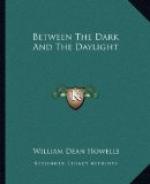“That was my next to last Sunday supper with my wife, before she became my wife, at her mother’s house, and I went to the feast with as little gayety as I suppose any young man ever carried to a supper of the kind. I was told, afterwards, that my behavior up to a certain point was so suggestive either of secret crime or of secret regret, that the only question was whether they should have in the police or I should be given back my engagement ring and advised to go. Luckily I ceased to bear my anguish just in time.
“The fact is, I could not stand it any longer, and as soon as I was alone with her I made a clean breast of it; partially clean, that is: I suppose a fellow never tells all to a girl, if he truly loves her.” Minver’s brother glanced round at us and gathered the harvest of our approving smiles. “I said to her, ‘I’ve been having a wedding present.’ ‘Well,’ she said, ’you’ve come as near having no use for a wedding present as anybody I know. Was having a wedding present what made you so gloomy at supper? Who gave it to you, anyway?’ ‘Old Blakey.’ ’A painting?’ ‘Yes—a sketch.’ ‘What of?’ This was where I qualified. I said: ‘Oh, just one of those Sorrento things of his.’ You see, if I told her that it was the villa where we first met, and then said I had left it in the horse-car, she would take it as proof positive that I did not really care anything about her or I never could have forgotten it.”
“You were wise as far as you went,” Minver said. “Go on.”
“Well, I told her the whole story circumstantially: how I had kept the sketch religiously in my lap in the train, and then held it down with my hand all the while beside me in the first horse-car, and did the same thing in the Back Bay car I changed to; and felt of it the whole time I was talking with General Filbert, and then left it there when I got out to leave the flowers at her door, when the awful fact came over me like a flash. ‘Yes,’ she said, ’Norah said you poked the flowers at her without a word, and she had to guess they were for me.’
“I had got my story pretty glib by this time; I had reeled it off with increasing particulars to the Westchester Park station-master, and the head man at the stables, and General Filbert, and I was so letter-perfect that I had a vision of the whole thing, especially of my talking with the general while I kept my hand on the picture—and then all was dark.
“At the end she said we must advertise for the picture. I said it would kill Blakey if he saw it; and she said: No matter, let it kill him; it would show him that we valued his gift, and were moving heaven and earth to find it; and, at any rate, it would kill me if I kept myself in suspense. I said I should not care for that; but with her sympathy I guessed I could live through the night, and I was sure I should find the thing at the Milk Street office in the morning.




